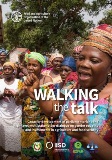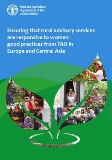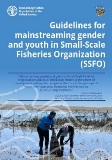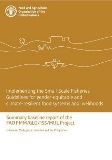Publications

Walking the talk: Capacity development of parliamentarians and high-level multistakeholder dialogue on gender equality and investments in agriculture and food security
01/05/2024
This report is based on the high level forum and capacity development for parliamentarians held in Sierra Leone in November 2020 organized by FAO,IISD, OXFAM and WILDAF/AMNet, in partnership with the Sierra Leone Parliament. 24 pp.

Guide to mainstream gender in the FAO project cycle
01/04/2024
This is an updated version of the 2017 Guide to mainstreaming gender in the FAO project cycle. It provides project formulators with practical guidance and tools to implement the gender related requirements established in the different phases of the FAO project cycle, and to support the formulation of projects and programs that contribute to advancing gender equality and women’s empowerment in agrifood systems, as foreseen by FAO’s mandate. 32 pp.

Ensuring that rural advisory services are responsive to women: good practices from FAO experiences in Europe and Central Asia
01/04/2024
This report builds upon FAO’s work promoting gender mainstreaming in extension and advisory services, cataloguing challenges and suggesting strategies for increasing the gender responsiveness of rural advisory services globally. The purpose of this review is to apply FAO’s accumulated knowledge about gender equality in the context of rural advisory services to assess the situation in the Europe and Central Asia region. 64 p.

Guidelines for mainstreaming gender and youth in Small-Scale Fisheries Organizations (SSFO)
01/04/2024
Stemming from Namibia's successful implementation of sustainable fishing guidelines, the publication emphasizes gender equality and youth involvement for food security and poverty eradication. It offers practical guidance for establishing gender and youth-responsive Small-Scale Fisheries Organizations (SSFO) to promote sustainability and social equity in the sector. 8 p.
.tmb-th600x450.jpg?Culture=en&sfvrsn=de3ecac5_1)
Rural women and financial inclusion
25/03/2024
Improving the gender-responsiveness of design and delivery of rural finance interventions through innovative approaches and mechanisms is important for promoting rural women’s economic empowerment. This document highlights practical and actionable approaches from the sector in order to guide the work of practitioners engaging at country level to pursue the above objective. 72 pp.

The unjust climate
05/03/2024
This report assembles an impressive set of data from 24 low- and middle-income countries in five world regions to measure the effects of climate change on rural women, youths and people living in poverty. It analyses socioeconomic data collected from 109 341 rural households (representing over 950 million rural people) in these 24 countries. These data are combined in both space and time with 70 years of georeferenced data on daily precipitation and temperatures. 120 p.

Briefing note on Gaza and West Bank
01/03/2024
This brief focuses on assessing the gender-related impacts of the current hostilities in Gaza, emphasizing the importance of understanding the specific needs and vulnerabilities of men, women, girls, and boys. It highlights the necessity of identifying gender-based constraints and vulnerabilities to ensure an appropriate and accountable response that leaves no one behind. 8 p.

Implementing the Small-Scale Fisheries Guidelines for gender-equitable and climate-resilient food systems and livelihoods
01/03/2024
The project supports the implementation of the Voluntary Guidelines for Securing Sustainable Small-Scale Fisheries in the Context of Food Security and Poverty Eradication (the SSF Guidelines), giving particular attention to the post-harvest sector in seven countries in sub-Saharan Africa: Ghana, Malawi, Sierra Leone, Uganda, the United Republic of Tanzania, Madagascar, Namibia, and two countries in Asia: Indonesia and the Philippines. 58 p.
